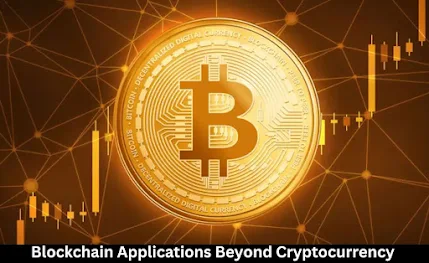The blockchain technology that powers cryptocurrencies like Bitcoin and Ethereum is now expanding beyond the financial sector. With its secure, transparent, and decentralized nature, blockchain is becoming an important tool across various industries.
Let's explore how blockchain operations are revolutionizing fields beyond cryptocurrency, working real- world problems and driving invention.
Blockchain is a distributed tally technology( DLT) that records deals in a secure, transparent, and inflexible way. Unlike traditional centralized databases, blockchain operates on a network of computers( or bumps), where each party has access to a dupe of the entire tally. This ensures that data is tamper- evidence, vindicated by agreement, and accessible to all actors. This position of security and translucency is what makes blockchain seductive for uses beyond cryptocurrency.
In force chain operation, blockchain enables companies to track products at every stage, from raw material sourcing to delivery to the consumer. This increased translucency helps help fraud, reduces crimes, and ensures responsibility.
For illustration, Walmart uses blockchain to track food products from ranch to shelf, icing quality control and helping identify impurity sources in case of foodborne illness outbreaks. This helps make consumer trust and ameliorate force chain effectiveness.
2. Healthcare
Blockchain technology is addressing some of healthcare's most burning issues, similar as data sequestration, interoperability, and medical record operation. With blockchain, case records can be securely stored and participated across different healthcare providers while maintaining sequestration and compliance with regulations like HIPAA.
Companies like MedRec are using blockchain to enable cases to control their medical data. This empowers cases with power over their health information, allowing them to grant access to different providers as demanded.
3. Voting Systems
Blockchain- grounded voting systems have the eventuality to enhance the integrity and translucency of choices. By recording votes on a blockchain, authorities can insure that each vote is counted directly and that tampering is nearly insolvable.
Governments worldwide are exploring blockchain voting as a way to increase namer trust and participation. For illustration, Estonia has piloted blockchain voting to allow citizens to share in choices securely and accessible, icing a fair voting process.
4. Real Estate
In real estate, blockchain can simplify property deals by barring interposers like brokers and attorneys. Property power details can be stored on a blockchain, making buying and dealing parcels more effective and reducing the threat of fraud.
Smart contracts, which execute automatically when predefined conditions are met, can also streamline processes. For example, Propy, a blockchain- grounded real estate platform, allows buyers and merchandisers to complete real estate deals online, reducing costs and detainments associated with traditional styles.
5. Intellectual Property and Brand
Blockchain offers a decentralized way to cover intellectual property( IP) and manage brands. Artists, pens, and generators can register their workshop on a blockchain, icing they admit proper criterion and royalties for their creations.
Blockchain- powered platforms like MediaChain allow generators to register their work and cover it from unauthorized use. This also makes it easier for consumers to corroborate the authenticity of digital content, similar to music, art, or literature, erecting trust between generators and their cult.
6. Energy Trading
Blockchain enables peer- to- peer( P2P) energy trading, allowing individuals to buy and sell redundant energy without interposers. This is particularly useful in renewable energy requests, where individualities induce their own energy through solar panels or wind turbines.
Platforms like Power Ledger are creating decentralized commerce for energy trading. By using blockchain, druggies can trade energy directly with others in their community, promoting sustainable energy consumption and reducing reliance on traditional mileage companies.
7. Identity Verification
Blockchain technology can simplify identity verification processes, enabling druggies to have a secure, digital identity that can be used across platforms without constantly participating in particular information.
For example, platforms like uPort allow druggies to produce tone-autonomous individualities, giving them control over their particular data. This has counteraccusations for banking, online services, and any operation where identity verification is essential.
8. Education and Credential Verification
Blockchain can also transfigure education by furnishing a secure way to corroborate credentials and academic achievements. With academic records stored on a blockchain, employers and institutions can corroborate qualifications snappily and reliably.
systems like Learning Machine and Blockcerts offer blockchain- grounded results for educational institutions to issue digital instruments. This ensures that scholars’ credentials are tamper- evidence and empirical by any institution or employer, reducing credential fraud.
9. Charity and Donations
Blockchain can bring translucency to charitable associations by tracking donations and icing they reach intended donors. benefactors can view where their finances go and how they’re used, fostering trust in charitable paying.
For illustration, GiveTrack is a blockchain platform that allows benefactors to track their benefactions to specific systems, icing responsibility and translucency within charitable associations.
10. Agriculture
Agriculture is embracing blockchain to ameliorate effectiveness, translucency, and food safety. By tracking crops from ranch to chopstick, blockchain technology helps insure sustainable practices, reduce food fraud, and optimize force chain operations.
For example, IBM Food Trust is working with growers, distributors, and retailers to track food force chains. This visibility helps reduce food waste, streamline processes, and ensure that consumers admit safe, high- quality products.
Final studies Blockchain's Implicit Beyond Cryptocurrency
Blockchain’s eventuality to reshape diligence beyond cryptocurrency is immense. From securing particular data and vindicating deals to promoting translucency and responsibility, blockchain operations are helping colorful diligence break complex challenges. As further associations embrace blockchain, we can anticipate to see indeed more innovative uses for this transformative technology.
Blockchain is further than just the technology behind cryptocurrency — it’s a game- changing result that promises a secure, transparent, and effective future across a broad diapason of diligence.

